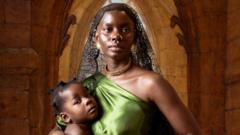In a world where multiple identities converge, Dola Posh embodies the roles of a photographer, a woman, a Nigerian, a mother, and a Briton. Yet, following the birth of her daughter, Dola found herself lost in the chaos of newfound motherhood. Just six days post-delivery, she lay in a hospital bed amid the COVID-19 lockdown, contemplating how her life had shifted irrevocably. The isolation and the demands placed upon her intensified her struggles, making her question if she could ever return to her passion for photography.
Through a barrage of calls from relatives who were eager to check in, the pressure mounted. With her mother thousands of miles away in Lagos, Nigeria, Dola felt her identity slipping away. "I thought: ‘I’m me; the baby’s out, I’m still me.’ But no, I wasn’t me any more,” she reflected. This existential crisis resonated deeply with Dola, one of many black women who experience postnatal depression aggravated by loss of identity and support.
Emerging from the hospital, Dola was bombarded with unsolicited parenting advice that compounded her feelings of inadequacy, pushing her further into despair. Struggling to cope with sleepless nights and isolation, a dark voice in her mind suggested taking her own life. It was during these moments of despair that she grasped a lifeline—her camera.
Dola found solace through self-portraits, creatively documenting her journey. The emotional weight of motherhood became the focal point of her work, where she channeled her experiences into images. When her baby, Monioluwa, became seriously ill, Dola’s anxiety peaked, and she described her soul feeling “lost.” Shortly after, she reached out for help, contacting her health visitor in a moment of desperation. That call marked a turning point in her journey.
Encouraged by her therapist, she took her camera and turned it towards herself, too. Drawing on the themes of motherhood captured through a historical lens, her photography began to unveil her inner struggles and triumphs. The familiar imagery reminiscent of religious iconography emerged as she deliberately configured her compositions, unknowingly reflecting her upbringing in a religious household rich in maternal symbolism.
The project evolved as Dola explored the overlap of her identities as a mother and an artist. Realizing that sharing her story could liberate her from the stigma of shame, she shifted her narrative: “I want a world where black mothers don’t have to carry so much burden… and feel reflected in the media.” Her commitment to trauma and healing through art led her to claim an award from Leica, providing her a platform to continue advocating for mental health awareness specifically for black mothers facing similar challenges.
Dola asserts it is crucial for women to openly discuss their traumas and recovery, making space for validation. “It’s new for a woman to stand there and say: ‘I almost ended my life, I’m not ashamed of it.’” Dola Posh's multifaceted journey not only captures the spirit of resilience but aims to reshape narratives for marginalized voices within the motherhood experience.





















